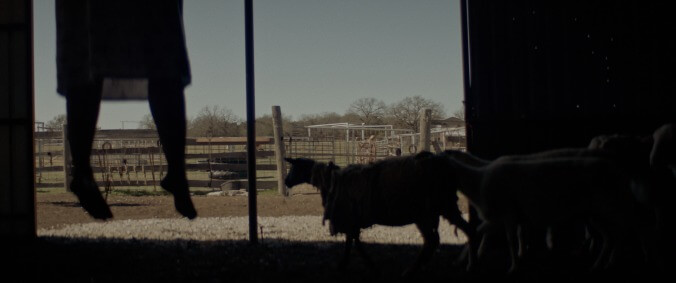It begins with the wind—a reedy, high-pitched whistle cold enough to make your bones hurt. Then the music comes in, bows drawing over strings in a screeching echo of more natural harbingers of doom. Layer on the howling of faraway wolves, lay it on a thrumming base of electromagnetic static, and you’ve got a sonic palette designed to make your limbic system light up like a carnival midway. Not with pleasure, mind you, but with foreboding: Something unnatural and unholy is coming, and there is nothing we—the viewer or the characters on screen—can do to stop it.
This sense of morbid inevitability, of death laughing at humanity’s feeble platitudes about the power of love and God’s plan, is at the heart of The Strangers writer-director Bryan Bertino’s savagely efficient new film The Dark And The Wicked. This film is about vicious nihilism as much as it is about anything, and if a character expresses hope or happiness at any point during its compact 95-minute running time, you can bet that fate is going to make them look like a fool. Even the moralistic message that lurks under the surface of many horror movies is absent here; the evil in this film appears to be Biblical in nature, but faith and virtue are no more effective at stopping it than denying its existence altogether.
That’s not to say that there isn’t any guilt at play. Building on what’s become a subgenre unto itself in recent years, The Dark And The Wicked grounds its horror in difficult emotions around family bonds—specifically, the guilt an estranged child might feel about “abandoning” their parents. We establish this early on, when siblings Louise (Marin Ireland) and Michael (Michael Abbott Jr.) arrive at the family sheep ranch in rural Texas. Their father (Michael Zagst) has been ill for quite some time, and his children have come home for a final reunion before he dies. It’s been years since Louise and Michael last spoke—their first night back, they awkwardly compare notes on jobs and relationships while smoking cigarettes on the front porch—and they’ve fallen out of touch with what’s going on back home, too.
That realization hits like a sandbag thrown from a great height about 15 minutes in, as Bertino chooses an absolutely brutal development—Mom (Julie Oliver-Touchstone) chopping her fingers to bits with a kitchen knife before hanging herself in the barn—to kick off the plot. In their attempts to understand this shocking event, committed atheists Louise and Michael, much like Chris MacNeil in The Exorcist, are eventually forced to admit that the threat to their family may actually be supernatural in nature. As the priest played by Xander Berkeley ominously puts it while on a house call: “Do you think the wolf cares if you believe he’s a wolf? Not if he finds you alone in the woods.”
Another characteristic The Dark And The Wicked shares with The Exorcist is its pitiless staging of scenes where a demon taunts a mortal by taking the form of a deceased loved one. In this case, that means Mom makes a handful of encore appearances, both in what seems to be corporeal form and as a more traditional, shadow-in-the-corner sort of apparition. The latter appearances are rare, though, as for the most part Bertino and cinematographer Tristan Nyby film the movie’s scare scenes from the same detached perspective as they do more mundane sequences of grim familial duty. Sometimes, the two are mixed, as when Louise is startled by her dazed father after he wanders out of bed late at night, urine running down his leg. Only in dreams and visions does The Dark And The Wicked turn surreal, and these, too, are ferocious.
The entire film is suffused with deep shadow, frequently lit by a single, direct bulb that throws harsh white light across the part of the screen that is visible. Characters appear as silhouettes in front of open doors, black as the death curse that has inexplicably fallen upon this seemingly ordinary family. That’s the “Dark,” but where’s the wicked? The fact that acts of sacrifice and acts of cowardice reap the same frightening, violent rewards, perhaps, or the glee with which the entity, whatever it is, torments Louise and Michael’s guilty consciences. Although its bleak worldview may be a turnoff for viewers who like their media a bit more life-affirming, if you’ve ever said to a friend, “it’s so fucked up, you’ve got to see it,” The Dark And The Wicked is one horror movie that lives up to its title.









































